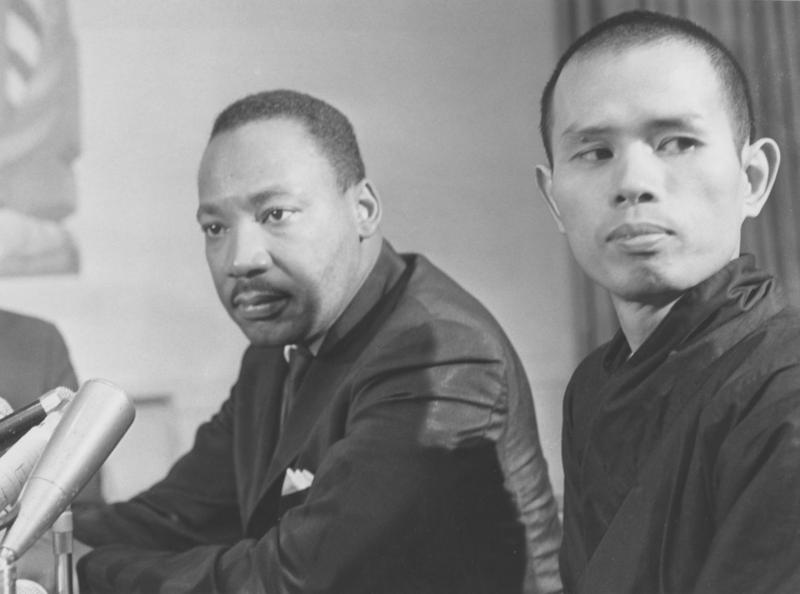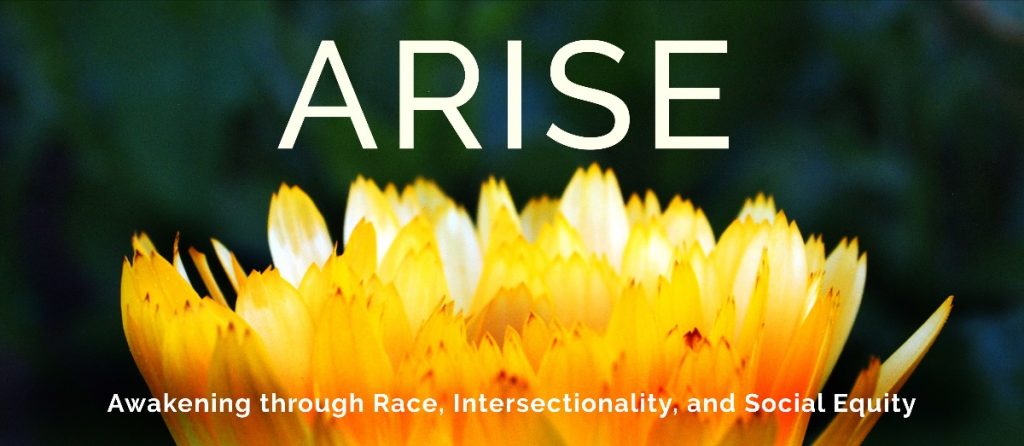ARISE
June 20, 2020
As we acknowledge Juneteenth, June 19, 1865, the day that commemorates the ending of slavery in the United States, we return to the roots of our ancestors in celebration of the legacy and wholehearted work for liberation for all Black people. And, as we have seen by recent events and the growing movement for racial justice, there is more to do in order to bring peace and justice to our world. ARISE offers a Call to Love In Action, a Call to the Living and Engaged Dharma.
A Call to Love in Action
With a deep bow of gratitude to our Beloved teacher, Ven. Thich Nhat Hanh, to our ancestors and teachers, to the Vietnamese people, holding the roots of the Plum Village practice, and to practitioners worldwide, we offer this Call to Action: A Call to Love in Action, this Call to the Living and Engaged Dharma.
We ‘say their names.’ We mourn the brutal and shocking murder of George Floyd, Tony McDade, Breonna Taylor, and Ahmaud Arbery, as well as the death of countless other Black and Brown people whose lives have been taken by unlawful police violence.
We say their names. We say, Black Lives Matter.
In light of historical and recent police violence on Black communities, we are called forward as individuals in our practice and collectively in our mahasangha. The global pandemic and the shockingly high rates of mortality from COVID-19 among Black and Brown people have served to unmask the racial disparities that have long been documented. Marginalized people and Black people, in particular, have been systematically subjected to racist laws, policies, patterns of discrimination in education, housing, health care, employment, law enforcement, and a complex array of racialized impacts. These conditions compound suffering not only for Black people but for all people. The suffering of others is also the suffering of our own; no one is separate from Black and other marginalized communities: their suffering is our suffering.
As practitioners, we vow to alleviate the suffering of all beings. We hear the call of justice to lift up the beauty of Black lives, of Indigenous lives, of Latinx lives, of Asian lives, of immigrant lives, of differently abled lives, of economically fragile lives, of people of all gender expresssions, of those who live in fear of violence, hatred, and discrimination. We extend our hand and our heart in compassionate action. Let us infuse the energy of compassion with the energy of love in action toward engagement as part of our great vow to all beings.
We say justice and peace inter-are. If we want peace; we must take action for justice.
We are reminded of our teacher, Ven. Thich Nhat Hanh’s words: “Contemplative reflection on the suffering of living beings is not enough; we must help diminish suffering through compassionate involvement.”
Frederick Douglass: “If there is no struggle there can be no progress.”
We are reminded that our Plum Village tradition has roots in both great turmoil and compassionate action. During the war in Vietnam, in the 1960s-70s, our teacher, Ven. Thich Nhat Hanh, and early Order of Interbeing members helped war victims, organized demonstrations, printed books and leaflets, established the School of Youth for Social Service, developed self-help villages, and continued to rebuild villages after they were bombed. Thay wrote that this was dangerous work, where one could lose their life at any moment from a bomb or firefight, “but our hearts compelled us to go to the victims in these forbidden zones.” As the continuation of our beloved Thay, our mahasangha must carry this legacy of compassionate action forward, by listening to the needs and guidance of those most harmed by this violence, and responding from a heart of love.
Like the cedar tree that grows straight and tall, that offers shade and life to all, we take refuge in the sangha’s wisdom and energy of action in service of racial and social justice for all beings.
Today, we ARISE, call forward our multi-fold mahasangha to pause and act in the Living and Engaged Dharma. Let our outward actions be guided by a heart and mind that has looked inwardly at our own assumptions, fear, complicity; and developed openness, forgiveness, tenderness, and understanding. As we recognize the structures and systems of racial injustice and social oppression and take action to dismantle them, we begin with ourselves, our Sanghas, our communities. Join us in this Call to Love in Action grounded in the Dharma of love, Interbeing, compassion, and understanding.
As individuals and as a sangha, let us ‘go as a river’ together toward greater justice and peace. This is our path:
As Individuals
A. Turning inward to pause and take good care of our body, heart and mind
- Regular, restful sleep
- Daily exercise, mindful movement
- Healthy eating
- Dancing, listening to music, creating art, being in nature etc
- Nourishing sharing with loved ones and strangers
B. Renewing and gladdening our minds with the deep, healing, and powerful teachings of our practice
- Daily sitting and walking meditation
- Touching the Earth Practices
- Deep Relaxation
- Gratitude Practice
- Reciting the 5 Mindfulness Trainings (5 MTs) and the new “Contemplations on the 5 MTs: A New Paradigm for Racial Justice and the Global Pandemic”
- Fourteen Verses on Meditation
C. Deepening our understanding of the historical roots of our collective and individual relationship with each other
D. Looking deeply with courage into the pain of racial injustice and social oppression for transformation and liberation
E. Embracing our Second Body practice, in pairs or small groups, and with guidance from ARISE training and materials and the sangha’s wisdom, to support one another in uncovering and healing the white racist conditioning that we have all internalized. Recognizing that understanding racial socialization and conditioning is a lifelong process of inquiry, reflection, and engagement that requires accountability and cannot be done in a vacuum. Beginning this process, not waiting for ‘perfect conditions,’ while seeking support within the sangha is critical.
As a Community, Our Sanghas
A. ARISE Racial and Equity Training (in process) is supported by Plum Village
- Training, for lay and monastic sangha facilitators, and the mahasangha generally, in understanding white supremacy and racial justice, etc.
B. Annual Black, Indigenous, People of Color (BIPOC)/Black, Asian, Minority Ethnic (BAME)/the Global Majority retreats at all US monasteries
- In the larger mahasangha, Black and Brown people report not feeling ‘seen’ and feeling ‘excluded,’ further deepening isolation and alienation. Due to the lack of Black and Brown people in our multi-fold
C. Change to the Order of interbeing (OI) aspirant and Dharma Teacher (DT) selection process
- Due to the gross underrepresentation of Black and Brown people in the Order of Interbeing (OI) and among Dharma Teachers (DTs) and monastics, a renewed and re-imagined process to address the structural disadvantages, policies, and practices that inhibit Black and Brown people from these roles. [Refer to Appendices]
D. ARISE is included among the Plum Village (PV) officially recognized groups
- Black and Brown people turning toward/or questioning whether to remain with PV as a spiritual practice tradition will feel that our tradition understands their history and legacy of racism
- With the support of PV, our 85% majority white lay community will come to understand that PV is intentional about looking into and addressing the lack of Black and Brown people in our sanghas
E. Resources, spaces for BIPOC/BAME sanghas, teachers and monastics.
- Support for monastics of African-American, Indigenous, Latinx, minority-ethnic ancestry to heal the cultural and generational trauma from racism, colonialism and other forms of marginalizations.
- Support for BIPOC/BAME lay practitioners and sanghas to heal the cultural and generational trauma from racism and colonialism, and other forms of marginalizations.
F. Resources, spaces for White sanghas, teachers and monastics, and for the Vietnamese monastic community
- Support for White monastics and lay friends to heal the cultural and generational trauma from White privilege and White fragility within a history and legacy of racism and colonialism, and other forms of marginalizations.
- Support for our Vietnamese monastic and lay communities to heal cultural and generational trauma
As a Society
A. Engaging mindfully in peaceful protest that challenges the systems and structures of racial injustice and colonialism locally, nationally, globally
B. Engaging mindfully in letter writing campaigns, petitions, and testimony that challenge policies, laws, and institutionalization of systems and structures of racial injustice and colonialism locally, nationally, globally
C. Engaging mindfully in letter writing campaigns, petitions, and testimony that offer alternative ways (e.g. redistribution of income such as Basic Income Guaranteed) for us to bring about racial equity, justice, and reconciliation in our communities (workplace, schools, housing, healthcare, transportation, recreation)
D. Propose solutions for alternatives leading away from local and national undue forceful policing including, for example:
- Demilitarize domestic policing – the United States has increased its use of war-zone tactics and equipment in police departments over the years (which is unconstitutional)
- Redesign police departments, dismantle those departments with officers charged with undue police force
- Establish Civilian Review boards empowered to stop undue, forceful policing
- Systematic re-training of policing in regard to racial justice and equity, community relations, trauma-informed policing
- Divest police departments/reinvest funds in health and social services that address issues of behavioral health, truancy, homelessness, addiction, domestic violence, mental health (which have fallen into the domain of ‘policing’ due to underfunding)
- Create a database of all undue police force leading to injury and death accessible to legal and public health departments
- Stronger laws against immunity from liability, offer other legal standards to bring lawsuits against unlawful police conduct, and laws to address security checks and clearance of police officers
- Fund education, affordable housing, health, recreation, transportation, vocational training in historically redlined and marginalized communities.
- Reframe racial violence and its constellation of issues as a public health crisis.
- Cultivate awareness of the School to Prison pipeline
We are called forward to lift up Black lives and Black voices, knowing that we are lifting up all lives and all voices. Our grief is a Dharma door. Our compassionate action is the raft to the shore of liberation. Our spiritual practice and deep listening invites the compassionate energy of Avalokiteshvara, the clear seeing of Manjushri, the fearless action of Kshitigarbha, to ourselves and others. This means creating and yielding spaces for people of color in Sangha and in affinity groups. This means centering people of color and those at the intersections of marginalized groups.
Not until we begin and continue this internal and external work can we reach individual and collective understanding, compassion, and liberation. This is the mud in the lotus. This is a true manifestation of Love in Action and the Living and Engaged Dharma.
A deep bow,
ARISE Sangha
Awakening Through Race, Intersectionality and Social Equity
Albert Karcher
Anne Woods
Antoinette González
Sr. Clear Grace
Sr. Hai An
Kat Liu
Mairsela Gomez
Renita Wong
Valerie Brown
Victoria Mausisa
Resources:
How to Fight Without Hating: Lessons and Power in Love
How to Practice when the Fires of Grief are Burning
ARISE Resources
Appendices:
ARISE 2017 POC OI/Dharma Teacher Proposal
ARISE 2018 Letter to North America Dharma Teachers Council (NADTC) on Creating Inclusive Community
ARISE recommendations to NADTC for OI aspirancy process 2020
Valerie Brown’s recommendations to NADTC for OI aspirancy process 2020


Thank you for this clear Call to Action! _()_
Vowing to reflect deeply on this guidance, and grateful for the opportunity to transform the suffering of racism in myself and the collective sangha body.
Thank you for your guidance, effort, and dedication!
Deeply bowing and deeply listening.
If you can create much more short articles like this, I would be truly grateful.
Anyway, thank you so much!